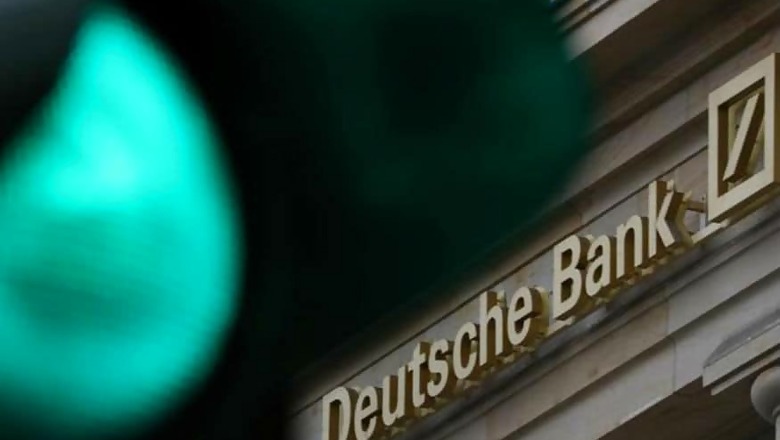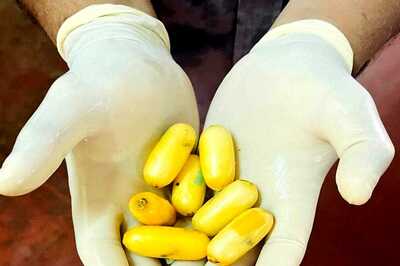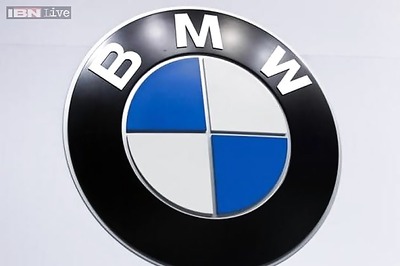
views
Frankfurt Am Main: Germany's largest lender Deutsche Bank said On Thursday it will slash over 7,000 jobs globally and dramatically scale back its investment banking activities as it seeks to turn the page on years of losses.
The announcement fell on the same day as the bank's annual general meeting, where newly appointed chief executive Christian Sewing tried to reassure investors Deutsche is ready to do what it takes to return to profitability.
"We are not yet where we should be. Therefore we must act, and we must act swiftly and forcefully," Sewing told a sceptical audience in Frankfurt.
In a statement ahead of the meeting, Deutsche said the number of full-time positions globally would fall from 97,000 "to well below 90,000", adding that the personnel reductions were already underway.
Deutsche did not mention which countries would be affected, but said a quarter of the jobs in its equities and sales trading business would be scrapped.
The jobs cull is the first big decision taken by Sewing, who unexpectedly replaced CEO John Cryan in early April.
Sewing had already signalled he was planning deep cuts at Deutsche's trouble-plagued investment banking arm, and shift the focus to more stable business activities such as retail banking, particularly in Europe.
"We remain committed to our corporate and investment bank and our international presence," Sewing said.
"We are Europe's alternative in the international financing and capital markets business. However, we must concentrate on what we truly do well." As part of the revamp, Deutsche said it will reduce the investment bank's exposures by over 100 billion euros (USD 117 billion), or around 10 per cent.
Deutsche also plans to step up its cost-cutting drive, aiming to reduce adjusted costs to 22 billion euros in 2019, compared with 23 billion this year.
"Overall, we see today's announcement as the right step," JPMorgan analysts said in a client note.
Investors were unimpressed however, with Deutsche shares plunging 4.7 per cent to 10.38 euros by 1545 GMT, against a DAX index of leading German shares down 0.6 per cent.
The mood was testy at today's shareholder gathering, which saw investors vent their anger over the bank's poor earnings results, high bonus payouts and last month's turbulent leadership reshuffle.
Former CEO Cryan was unceremoniously ousted after coming under growing pressure from leading shareholders and supervisory board chief Paul Achleitner, who accused the Briton of taking too long to get the financial giant back on track after it posted its third year of losses in 2017.
Sewing, a Deutsche veteran, has vowed to refocus Deutsche on retail banking and asset management, seen as more stable sources of income, while slimming down its share trading and other investment banking activities.
In corporate banking, Deutsche plans to slash its commitment to the United States and Asia, and focus more on Germany and Europe.
Other items on Deutsche's restructuring to-do list include fully integrating subsidiary Postbank into its German retail banking operations and further reducing its massive holdings of financial derivatives.
But Sewing struggled to win over the crowd in Frankfurt.
Ingo Speich, a fund manager at Union Investment, said the bank's state of health remained "worrying", likening Deutsche to a "giant with feet of clay".
"How can you cut back operations and reduce costs without massively losing market share and revenues?" he asked Sewing.
Deutsche's woes can in part be traced back to its bold attempt to compete with Wall Street investment banks in the years leading up to the financial crisis -- which left the German giant saddled with a toxic legacy of risky assets and costly legal challenges.
Although ex-boss Cryan was credited with neutralising the worst legal threats, including by paying billions in fines and compensation, he failed to drag the bank back into the black.
Deutsche even reported a bigger-than-expected net loss of 735 million euros in 2017, which it blamed mainly on US President Donald Trump's corporate tax reform.
By early 2018, disgruntled investors had driven the bank's share price to below half its 2015 level, prompting supervisory board chairman Achleitner to look for a new top manager.
Achleitner has since come in the firing line himself for overseeing years of failed strategies at the bank.
Shareholder advisor Hermes EOS said in a statement earlier this week that Deutsche should "start to consider plans for the succession of Paul Achleitner", calling for "more effective leadership and management stability" at the bank.


















Comments
0 comment